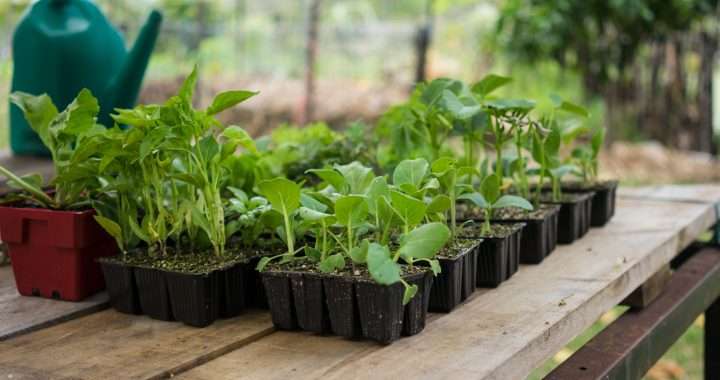
Planting vegetable seeds – open pollinated, hybrid or GMO?
Author : My Food Garden
Planting vegetable seeds using open pollinated, hybrid or GMO seeds is an important question for food gardeners. Saving your own vegetable garden seeds each year creates resilience in food growing.
As a gardener, your ideal is to start with the best quality organic seeds that give you the most healthy and robust crops (subject to your care) and then produce seeds that can be re-used in your own garden. However the way your seeds are created has a profound impact on whether the living cycle you aim to create is self-sustaining. Are they open pollinated, hybrid or GMO?
The other factor to consider is whether chemicals are used in the growing process for the plants that create the seeds and whether chemicals such as pesticides, rodenticides and fungicides are coated on the seeds prior to packing. Have you noticed the strange colour dust on some seeds?
So when you buy your seeds or attempt to save seeds, what do you need to know before making the decision to get the best quality seeds?
Open pollinated seeds
These have been used by farmers and gardeners planting vegetable seeds since agriculture began. The open pollinated seeds are produced from natural, random, open pollination by wind, birds or insects, resulting in plants that are naturally varied. Through carefully selecting open pollinated seed varieties that have beneficial traits like drought tolerance or good flavour. what nature provides can be improved with human care and thought. All heirloom seeds are open pollinated.
When a gardener or seed breeder raises open pollinated plants, it is ideal they keep the pollen from other related varieties from entering the patch (generally accomplished with distance from the other variety). If successful, the gardener will be able to select and save seeds from the very best plants in the patch and trust they will grow out next season with the same characteristics as their parent plant.
In choosing open pollinated seeds as your starting seed stock, it is ideal they have not been treated with chemicals which may have been in the breading plants or used during the preparation of seeds (pesticides, fungicides and rodenticides), Ask your seed supplier this important question. My local seed supplier is Eden Seeds are very much into open pollinated and heirloom seeds that are not chemically treated.
Hybrid seeds
Hybrid seeds are produced by companies through highly selective plant breeding to bring together two traits in each of the chosen varieties so that the resulting seed have both traits. So, for example, one tomato plant may be very drought tolerant and another tomato plant produces vigorously, the two plants might be cross pollinated through this hybrid process to produce a drought tolerant tomato plant that produces a lot of tomatoes.
Plants grown from hybrid seeds typically do not produce seeds that can be used to grow the same type of plants on the next crop and can even produce seeds that will not grow at all. If you see F1 hybrid on seed packets, you will know its not suitable for saving seed. Hybrid seeds can produce excellent crops but they are largely designed around forcing farmers and gardeners to keep buying seeds each year. Commercial farming, especially chemical farmers, around the world are heavily reliant on hybrid technology for planting vegetable seeds.
Hybrid seeds can be grown and prepared with chemicals but some organic seed suppliers, do sell hybrid seeds where they know that no chemicals have been used in the growing and seed preparation process.
GMO seeds
GMO seed varieties are created in a lab using high-tech and sophisticated techniques like gene-splicing. GMO seeds cross related and unrelated plants at times. The cross goes far beyond the bounds of nature so that instead of crossing two different, but related varieties of plant, they are crossing different biological kingdoms — like, say, a bacteria with a plant.
For example, Monsanto has crossed genetic material from a bacteria known as Bt (Bacillus thuringiensis) with corn. The goal was to create a pest-resistant plant. This means that any pests attempting to eat the corn plant will die since the pesticide is part of every cell of the plant.
GMO seeds are not likely to be designed for seed saving. There is much contention in the farming and scientific communities about the human and animal side effects of consuming GMO crops.
Saving your own vegetable garden seeds
If you want to build self reliance in your food garden, go with open pollinated for planting vegetable seeds. For the healthiest seeds also choose ones that are not chemically treated. If you are purely interested in yield and not seed saving for the year of planting, then using hybrid seeds is an option. Ideally they are also not chemically treated seeds. As you can see, it is a challenge, but if you are informed, you can make an objective decision.
By growing from a healthy seed and then using some of your own seed from the plants you have grown, you get to observe and experience an incredible living process from planting vegetable seeds. It is profoundly satisfying and I see this as another way to work such a process into your inner gardening.
Come along to one of our Workshops or talk to us about our Coaching service.
Happy planting
Authored by Peter Kearney – www.beta.myfoodgarden.com.au

